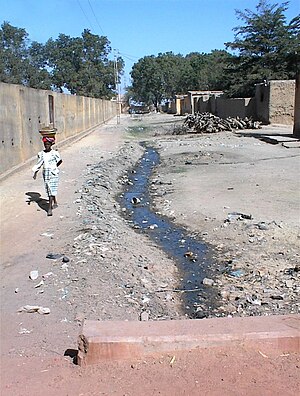Niono
Niono | |
|---|---|
Commune and town | |
 A woman walks down a side street in Niono, during the dry season, January 2003. | |
| Country | |
| Region | Segou |
| Cercle | Niono Cercle |
| Elevation | 277 m (909 ft) |
| Population (2009 census)[1] | |
• Total | 91,554 |
| (commune) | |
| Time zone | UTC+0 (GMT) |
Niono is a town and commune located in the Ségou Region of Mali. It is the seat of the Niono Cercle. As well as Niono the commune contains 20 villages and in 2009 had a population of 91,554. The town itself has around 5,000 people.[2] The town is the capital of Niono Cercle, one of six subdivisions (Cercles) of Segou Region. It is located on the northwest edge of the Inner Niger Delta, near the main channel of the Niger river.
Office du Niger
Niono is the central town of the Office du Niger irrigation scheme which was established during the last decades of French colonial rule and continued after independence by the Malian state. Water from the River Niger is diverted into a system of canals at the Markala dam 35 km downstream of Ségou. The water flows north for 65 km in the Canal du Sahel and is then used to irrigate the flat alluvial plains around Niolo that form part of the 'Delta Mort' (Dead Delta). Although the French colonial administration constructed the system to produce cotton for the textile industry, the main agricultural product is now rice. Each year around 2.7 km3 of water are diverted from the Niger corresponding to 8.3 percent of the total flow.[3] The water is used to irrigate about 750 square kilometers of farmland which in 1999/2000 produced 20,000 tons of rice representing 40 percent of the total Malian production.[4]
Architecture
The Great Mosque of Niono is perhaps the most internationally recognized site in the town having received the Aga Khan Award for Architecture in 1983.[5] A mosque on the site was constructed in 1945 and then subsequently enlarged. The present building dates from 1973. The mosques of Djenné and Mopti served as models.[6]
Development projects
Currently, there are at least two major humanitarian projects to ameliorate the lives of people in Niono and the outlying areas. Led by American and Malian Rotary Clubs and Engineers Without Borders (USA) Chapters, the groups surveyed in February 2008 a rainwater drainage. The drainage known as a "collecteur de pluies" in French runs 2 kilometers through the city center. During the rainy season, flooding causes havoc, and during the rest of the year, the drainage becomes a breeding ground for disease. The intent of the project is to construct mechanisms to minimize both flooding and unsanitary stagnant water in the drainage.[7]
A new paved road of is under construction between Niono and Timbuktu running to the north of the Inland Niger Delta. The 565 km road will pass through Nampala, Niafunké, Tonka, Diré and Goundam.[8] The completed 81 km section between Niono and the small village of Goma Coura[9] was financed by the Millennium Challenge Corporation. This new section will service the Alatona irrigation system development of the 'Office du Niger'.[10] The 484 km section between Goma Coura and Timbuktu is being financed by the European Development Fund.[8]
Notes
- ^ Resultats Provisoires RGPH 2009 (Région de Ségou) (PDF) (in French), République de Mali: Institut National de la Statistique.
- ^ USAID report, 2004.
- ^ Zwartz et al. 2005, p. 26.
- ^ Zwartz et al. 2005, p. 189.
- ^ Great Mosque of Nonio, ArchNet Digital Library
- ^ Cantacuzino, Sherban (1985), "Great Mosque of Niono", in Cantacuzino, Sherban (ed.), Architecture in Continuity, New York: Aperture, pp. 149–153, ISBN 978-0893811969.
- ^ http://ewb-chicago.org/projects/niono-mali
- ^ a b Coulibaly, Baye (24 November 2010), Route Tombouctou-Goma Coura: un nouveau chantier titanesque est ouvert, L'Essor, retrieved 19 March 2011
- ^ Niono-Goma Coura Road Inauguration, Embassy of the United States, Mali, 7-Feb-2009, retrieved 19 March 2011
{{citation}}: Check date values in:|date=(help) - ^ Mali Compact (PDF), Millennium Challenge Corporation, 17 November 2006
- Integrated Disease Surveillance and Response: Mali, United States Centers for Disease Control, Case study on Malian Ministry of Health Integrated Disease Surveillance and Response (IDSR) from 1998, June 2004.
References
- Zwarts, Leo; van Beukering, Pieter; Kone, Bakary; Wymenga, Eddy, eds. (2005), The Niger, a lifeline: Effective water management in the Upper Niger Basin (PDF), Veenwouden, the Netherlands: Altenburg & Wymenga, ISBN 90-807150-6-9.
External links
- Plan de Sécurité Alimentaire Commune Urbaine de Niono 2007-2011 (PDF) (in French), Commissariat à la Sécurité Alimentaire, République du Mali, USAID-Mali, 2007.

